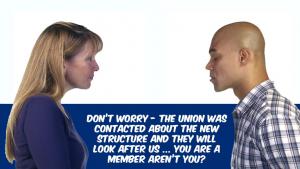This is update number 3 in a series of updates to be released over the next few months regarding Union member benefits which differ from non-union members, under the 2017 NSW Local Government (State) Award.
Our first update (19/3/18) covered the Union Picnic Day.
Our second (3/4/18) covered Disciplinary Procedures.
This update covers Workplace Change.
Workplace Change: Clause 39
 This particular clause which other than the disciplinary procedures clause has far more potential than almost all the rest of the award provisions to affect a workers’ working conditions or even their employment future.
This particular clause which other than the disciplinary procedures clause has far more potential than almost all the rest of the award provisions to affect a workers’ working conditions or even their employment future.
The clause refers to the Unions on twelve (12) separate occasions making the clause’s relevance to UNION MEMBERSHIP very important. Why not share this with a colleague who is not a member?
The clause breaks down into three (3) separate sections all of equal importance regarding the benefits and rights of a worker who BELONGS TO A UNION.
39. WORKPLACE CHANGE
(i) Employer’s duty to Notify a Proposed Change in Organisation Structure
Where the employer proposes a change in organisation structure that is likely to have significant effects on employees and/or result in a reduction in the size of the employer’s workforce, the employer shall notify the employee(s) who may be affected by the proposed change and the union(s) to which they belong, at least twenty-eight (28) days before the change is implemented.
a) Notice to the union(s) of a proposed change in organisation structure under subclause 39(i) (a) shall include:
1) The nature of the proposed change;
2) The reason(s) for the proposed change; and
3) The position(s) likely to be affected.
b) Notice to the union(s) of a proposed change in organisation structure under subclause 39(i)(a) may be given either before or after a definite decision is made.
c) The union(s) may, on being notified of the proposed change, respond to the employer in writing within the twenty-eight (28) days, addressed to the general manager. Any such response(s) received by the general manager shall be provided to the decision maker(s) within seven (7) days.
d) Notice to the union(s) of a proposed change in organisation structure under subclause 39(i)(a) shall not form part of any notice of termination under subclause 40(i).
e) Nothing in this subclause prevents the employer from immediately implementing a change in organisation structure with the consent of the affected employee(s), where the union(s) to which they belong have been provided a least seven (7) days’ notice of the proposed change.
The above subclause makes it abundantly clear that an employer who is seeking to make changes that may have a significant effect on them must notify the affected employee/s AND THE UNION TO WHICH THEY BELONG at least 28 days before seeking to implement any proposed change.
There is no mention or requirement in the award to provide such notice to anyone other than an affected employee AND THE UNION TO WHICH THEY BELONG.
Employers in our experience don’t ask non-members who else they should write to or to allow to represent them.
In such cases NON-MEMBERS ALMOST ALWAYS FIND THEMSELVES UNREPRESENTED at a time when their working conditions or even their employment future is at risk.
(ii) Employer’s Duty to Notify and Discuss Change after making a Definite Decision
- Where the employer has made a definite decision to introduce major changes in production, program, organisation structure or technology that are likely to have significant effects on employees, the employer shall notify the employee(s) who may be affected by the proposed changes and the union(s) to which they belong.
- The employer shall discuss with the employee(s) affected and the union(s) to which they belong, inter alia, the introduction of the changes referred to in sub-clause (ii)(a) of this clause, what affects the changes are likely to have on the employee(s) and shall avert or mitigate the adverse changes on the employee(s) and shall give prompt consideration to matters raised by the employee(s) and/or their union in relation to the changes and may reconsider its original decision.
- The discussion shall commence as early as practicable after a definite decision has been made by the employer to make the changes referred to in subclause (ii)(a) of this clause.
- For the purposes of the discussion, the employer shall provide to the employee(s) concerned and the union(s) to which they belong, all relevant information about the changes including the nature of the changes proposed, the expected effects of the changes on the employee(s) and any other matters likely to affect the employee(s).
- Competitive tendering – where employee(s) who are adversely affected by the proposed changes the request the employer’s assistance to submit an in-house bid and the employer refuses that request, the employer shall provide the reason(s) in writing.
The above subclause provides the right to UNION PARTICIPATION in discussions including the right for the UNION TO PUT FORWARD SUGGESTIONS and for the employer TO PROVIDE THE UNION with all relevant information.
This assists the employee who is a member of a union to receive proper representation before and during the process to achieve the best possible outcome.
(iii) Discussion before Termination
- Where the employer has made a definite decision that it no longer wishes the job the employee has been doing done by anyone pursuant to subclause (ii)(a) of this clause and that decision may lead to the termination of employment, the employer shall hold discussions with the employee(s) directly affected and with the union(s) to which they belong.
- The discussion shall take place as soon as it is practicable after the employer has made a definite decision which shall invoke the provision of paragraph (iii)(a) of this subclause and shall cover, inter alia, any reasons for the proposed terminations, measures to avoid or minimise the terminations and measures to mitigate any adverse effects of the terminations of the employee(s) concerned. Measures to mitigate the adverse effect on employees may include consideration of re-training opportunities, redeployment, recruitment advice, the payment of relocation allowances, provision of additional notice, access to an employee assistance program, financial advice and such other assistance as my be reasonably available.
- The employer shall not unreasonable refuse a request by an employee to work through the notice of termination period in subclause 40(i) to better enable the employee to explore opportunities to mitigate the adverse effects of workplace change. During such notice period, whilst the employee is able to undertake tasks and duties associated with their position, priority shall be given to activities that may enable the employee to find employment. Such activities may include, but not be limited to, training, redeployment opportunities, job interviews, financial advice and recruitment advice.
- For the purposes of the discussion, the employer shall, as soon as practicable, provide to the employee(s) concerned and the union(s) to which they belong, all relevant information about the proposed terminations including the reasons for the proposed terminations, the number and category of employee(s) likely to be effected and the number of employee(s) normally employed and the period over which the terminations are likely to be carried out. Provided that the employer shall not be required to disclose confidential information the disclosure of which would adversely affect the employer.
The above subclause again GUARANTEES THE RIGHT TO UNION REPRESENTATION in seeking to avoid forced redundancy or to negotiate for additional assistance should the decision to restructure stand.
Workers should be aware that past history has shown that workplace restructuring frequently occurs in many workplaces in Local Government and in fact Councils are required each four (4) years following their local Council elections to review their structure within twelve (12) months.
Workplace change has been accelerating over the past decade and now with the recent decision by the State Government to establish Joint Regional Organisations and other reforms, the risk of being affected under this clause is increasing substantially.
USU MEMBERS WILL BE REPRESENTED
IF YOU ARE NOT IN ONE OF THE INDUSTRY UNIONS COVERED BY THE 2017 NSW LOCAL GOVERNMENT (STATE) AWARD WHO WILL REPRESENT YOU?
For further information please contact the Union on 1300 136 604, or your local organiser.




